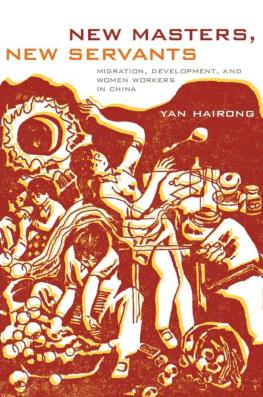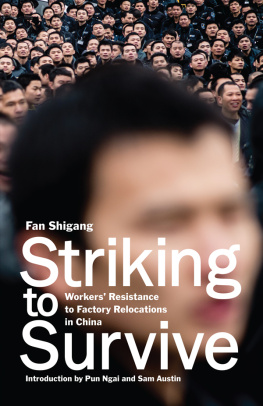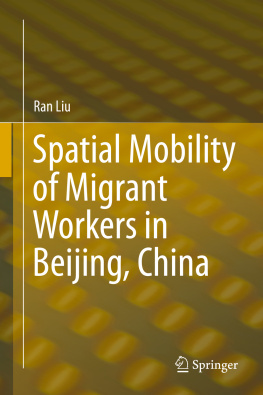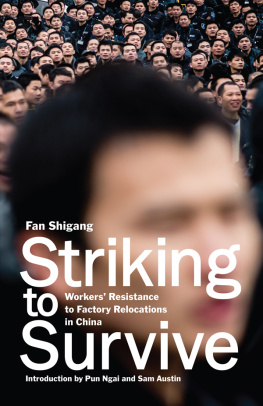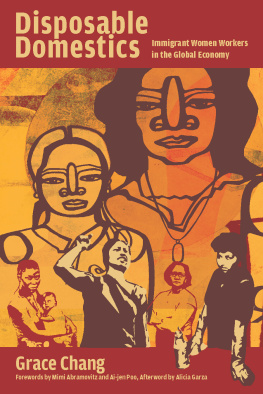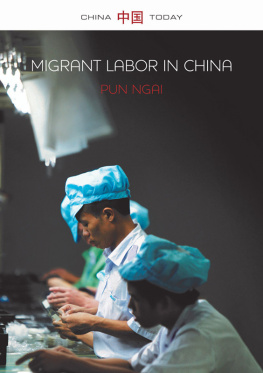New Master, New Servant
New Master, New Servant
Migration, Development, and Women Workers in China
Yan Hairong
Duke University PressDurham and London2008
2008 Duke University Press
Printed in the United States of America on acid-free paper 
Designed by Heather Hensley
Typeset in Adobe Garamond Pro by Tseng Information Systems, Inc.
Library of Congress Cataloging-in-Publication data and republication acknowledgments appear on the last printed pages of this book.
Licensed under the Creative Commons Attribution-Non-Commercial-NoDerivs License, available at http://creativecommons.org/licenses/by-nc-nd/3.0/ or by mail from Creative Commons, 559 Nathan Abbott Way, Stanford, Calif., 94305, U.S.A.
NonCommercial as defined in this license specifically excludes any sale of this work or any portion thereof for money, even if the sale does not result in a profit by the seller or if the sale is by a 501(c)(3) nonprofit or NGO.
Duke University Press gratefully acknowledges the support of the Chiang Ching-Kuo Foundation, which provided support toward the production of this book.
CONTENTS
PREFACE
In this book I focus on rural-to-urban migration of young women serving as domestic workers for urban families in China, examining and challenging some of the keywordssuch as development, modernity, suzhi (quality), human capital, self-development, and consumer citizenshipthat are constitutive of the process of post-Mao reform. Enabled by reform and opening up, rural-to-urban labor migration is a crucial site where these keywords are mobilized to produce truth-effects. Why? Because migrant labor is vital to the continuation of flexible accumulation and growth, which, on the one hand, allows the state and elite groups to claim legitimacy for the reform and, on the other hand, enhances their resources to negotiate and manage discontented urban laid-off workers and rural residents.
I carried out my main field research, which involved following migrant women from villages in Anhui Province to the city of Beijing, between fall 1998 and spring 2000. I also conducted some interviews in Nanjing, Tianjin, Hefei, and Shanghai during fifteen months of fieldwork. Since then, I have kept in touch with some migrants through reunions, letter writing, and phone calls. The struggles, aspirations, and subjection of these young migrant women articulate the power of the central story as it is structured by keywords, but also mark its limit as a proper story. The postsocialist reform has enabled the process of migrant subject constitution and self-representation, and haunted their struggles with its own discursive conditions and contradictions. On the whole, it is unable to produce their lives as proper referents for its keywords.
In I explore the subject of self-representation. As the laws of economic development appear to be the laws of nature, what kinds of self-representations are possible? Why do some migrant women negotiate a self-representation aligned with the hegemonic discourse of development when such a self-representation includes poverty, illness, and misery? How do other migrants critique such self-representation and articulate what might be considered a liminal politics of resistance?
My field research was funded by the Wenner-Gren Foundation for Anthropological Research and the International Dissertation Research Fellowship provided by the Social Science Research Council. Many people have contributed to the development and completion of this project. I owe a deep debt of gratitude to my mentors Ann Anagnost, Tani Barlow, Madeleine Yue Dong, Kaushik Ghosh, Stevan Harrell, and Katharyne Mitchell, who played important roles in my graduate training at the University of Washington. Tamara Jacka kindly pointed me to the magazine Rural Women Knowing All when I began my field research. Li Zhang generously offered fieldwork advice. Zhongdong Ma provided me with the first important connection to my fieldsite. My friends and colleagues Joel Andreas, Alana Boland, Chris Brown, Beth Drexler, Brian Hammer, Helen Schneider, and Wang Danyu have read and commented on various chapters in the dissertation phase. I must also thank Wang Hui and Huang Ping for encouraging me to publish in Dushu and Chen Kuan-Hsing and Ding Naifei for inviting my contribution to Taiwan: A Radical Quarterly in Social Studies .
I began to work on the book manuscript while I was a fellow at the Princeton University Society of Fellows (SOF). I thank SOF for its institutional support and am indebted to senior SOF fellows Susan Naquin and Carol Greenhouse for their intellectual generosity. My SOF colleagues Sujatha Fernandes, Anne-Maria Makhulu, Sunil Agnani, and I formed a reading group that provided critical intellectual stimulation and companionship. I am also grateful to Louisa Schein for making me part of the memorable reading-meal group that she organized, and I am thankful to other members of this groupChen Jin, Li Jin, and Wang Hailingfor both their food and their thoughts. During the years of its development, this project has greatly benefited from discussions with Pun Ngai, Dorothy Solinger, Eileen Otis, Eric Thompson, Tang Can, Liu Huiying, Han Jialing, Joshua Goldstein, Ren Hai, Fan Ke, and Arianne Gaetano. I am also grateful for friends who have inspired me with their support and concern: Nancy Abelmann, Karen Kelsky, Ravi A. Palat, Behrooz Ghamari, Han Yuhai, Zhang Xiaodan, Dai Fang, Pun Ngai, Hsia Hsiao-Chuan, Ku Hok Bun, and Wang Penghui. This book project has followed me to the University of Illinois, Urbana-Champaign, University of Hong Kong, and Hong Kong Polytechnic University. I thank my supportive colleagues at these universities. Two anonymous readers provided invaluable comments that helped refine and reshape the structure of the book. Matthew A. Hale thoughtfully edited the manuscript. Barry Sautman must be credited for his suggestion of the book title.
This project would not have been possible without villagers in Wuwei showing me kindness and migrant workers in the cities sharing their experiences. This book is dedicated to Chinese migrant women workers.
INTRODUCTION
The marginality of her story is what maintains the others centrality; there is no kind of narrative that can hold the two together (though perhaps history can): an outsiders tale, held in oscillation by the relationships of class.
CAROLYN KAY STEEDMAN, LANDSCAPE FOR A GOOD WOMAN
In spring 2001 I served as an interpreter in a meeting between ministry-level cadres from China and U.S.-based economists who consult with the World Bank. I witnessed a remarkable result of two decades of reform in China: the two parties shared the same conceptual language. Many of their keywords lined up quite literally. In table after table, in chart after chart, the universal language of economic development successfully coded the social landscape of post-Mao China as a transitional economy.
In the process of globalization the peripheries are increasingly coded, evaluated, and disciplined by regulative keywords: development, growth, efficiency, market, structural adjustment, consumer choice, optimal assemblage of resources, global governance, and so on. This occurs through the rapid and dense circulation of capital, knowledge, and technology, and through the uneasy traffic between the universality of global standards and the particularity of Chinese characteristics. I borrow the term keyword from Raymond Williams, who identifies a set of lexical changes since the eighteenth century as a guide to the intellectual transformation that accompanied Englands industrialization: I called these words keywords in two connected senses: they are significant, binding words in certain activities and their interpretation; they are significant, indicative words in certain forms of thought (1976: 13). While Williams approaches keywords in literary sources through a combination of social history and the history of ideas, I annotate some of the post-1989 keywords in China by locating them in ethnographic instances and examining their discursive functions in shaping everyday experiences. With the ebbing of revolutionary movements, the new global circulation of these keywords bespeaks the force of newly unlimited capital accumulation in the postCold War world. This army of keywords collaborates to form a semiotic matrix. Once one takes issue with any particular keyword, the rest come rushing to its aid. They are networked. Intertwined with this sign chain are a series of networked and continually networking local, national, and transnational institutions. Everyday the net is being managed, challenged, negotiated, mended, disrupted, reinforced.
Next page
